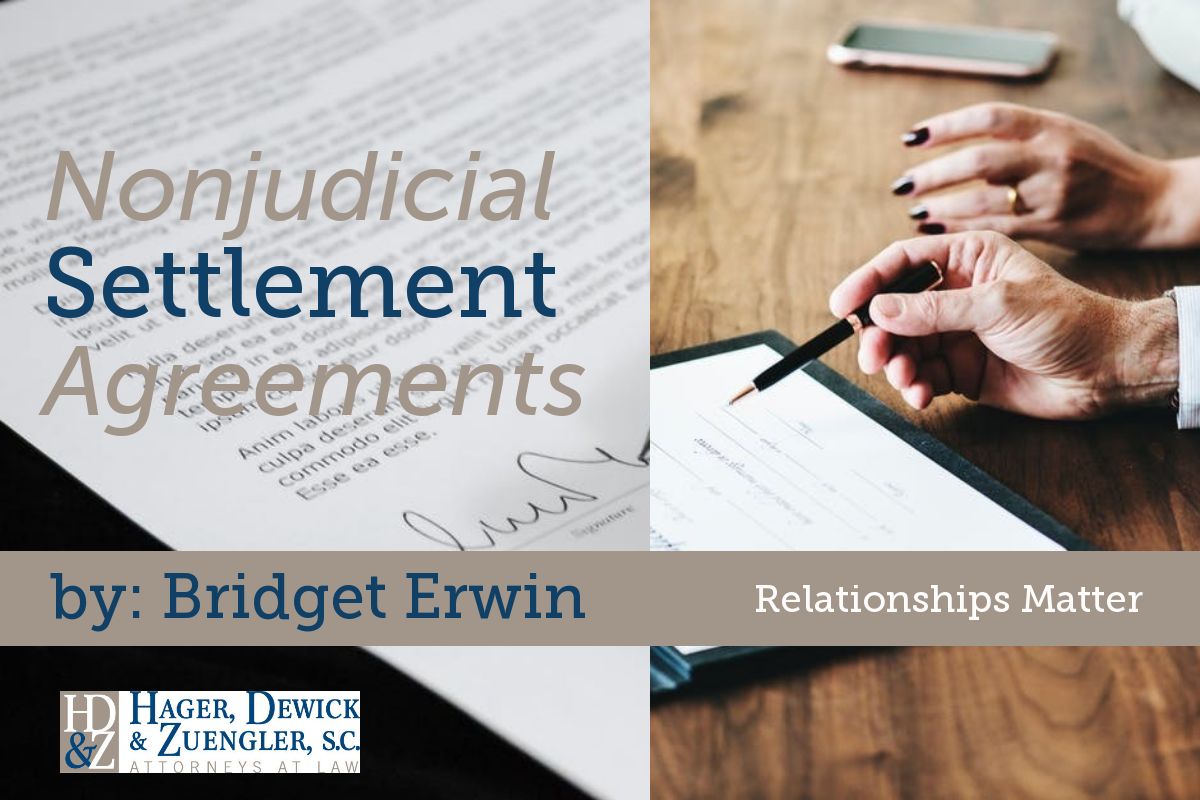
NONJUDICIAL SETTLEMENT AGREEMENTS: A MULLIGAN FOR IRREVOCABLE TRUSTS
By definition, “irrevocable” means “unable to be repealed or annulled; unalterable.” Historically, irrevocable trusts lived up to their name – they were permanent and unmodifiable absent a court order. Obtaining a court order to modify an irrevocable trust can be expensive and time consuming. In 2014, Wisconsin adopted the Uniform Trust Code, which brought about sweeping change to trust laws as we had previously known them. One such change is the ability to modify irrevocable trusts without a court order through the use of a nonjudicial settlement agreement (“NJSA”).
As planners, we aim to address a myriad of scenarios in the trust documents we draft. But without the proverbial crystal ball to aid us, we cannot guarantee our clients that an irrevocable trust will withstand changes in tax laws, family dynamics or other unforeseen events that may lie ahead. Using an NJSA, however, irrevocable trusts can be modified to address a multitude of scenarios. Specifically, Wisconsin Trust Code authorizes an NJSA to address matters including (1) interpretation or construction of the terms of a trust, (2) approval of a trustee’s report or accounting, (3) direction to a trustee to refrain from a particular act or granting a trustee a specific power, (4) resignation or appointment of a trustee, (5) transfer of the trust’s situs and governing law and (6) liability of a trustee for an action relating to a trust.
One of the most common and versatile uses of an NJSA is to eliminate a family trust (also known as a “credit shelter trust”) that is often established at the death of the first spouse in many living trust agreements. In 2019, the federal estate tax exemption equivalent is $11,400,000, which means that the estates of unmarried individuals dying in 2019 are subject to federal estate tax only if the value of the decedent’s assets exceed that sum. The current federal estate tax exemption equivalent is much higher than in the year 2000, for example, when it was just $675,000. To minimize the imposition of federal estate taxes at the second death, many trusts created in the 1990s and early 2000s called for the mandatory creation and funding of a family trust. Given the significant increase in the exemption equivalent amount, these family trusts may no longer be needed. By invoking the use of an NJSA, the otherwise irrevocable family trust can be terminated. As a result, all trust assets can be held by the surviving spouse, entitling those assets to a step-up in basis at the surviving spouse’s death, such that no capital gains tax will be due if the remainder beneficiaries sell the trust assets shortly thereafter. Further, the elimination of the family trust will eliminate record keeping and tax return compliance on an annual basis.
If the settlor (the person creating the trust) of an irrevocable trust is living, an NJSA must be signed by the settlor, the trustee and all beneficiaries of the trust. If the settlor is deceased, an NJSA can be signed by the trustee and all beneficiaries of the trust. It is important to note that if the settlor of the trust is alive, the scope of an NJSA can be broader. Namely, where a settlor is living, a modification to an irrevocable trust through an NJSA may generally be done for any purpose. If the settlor is not living, the modification cannot violate a material purpose of the trust. For example, many trusts call for staggered distributions to beneficiaries (e.g. one-half at age 25 and the balance outright at age 30). The settlor’s desire to provide for the beneficiaries over a span of time – perhaps to afford the beneficiaries an opportunity to learn to financially support themselves – is a material purpose of the trust. If the settlor is alive and consents to the same, an NJSA can be used to modify the trust to provide for outright distributions to the beneficiaries at age 21. If the settlor is not living, an NJSA cannot be used to bring about such a material change.
While nonjudicial settlement agreements afford practitioners yet another tool in their estate planning toolkit, they are just one option of many, should not be entered into lightly and should be considered in the context of the estate plan as a whole.
For more information, contact Bridget Erwin at [email protected]
